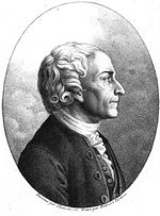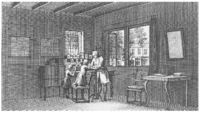
Abraham Trembley
Encyclopedia
Abraham Trembley was a Swiss
naturalist
. He is best known for being the first to study freshwater polyps or hydra
and for being among the first to develop experimental zoology
. His mastery of experimental method has led some historians of science to credit him as the "father of biology
".
 Trembley came from an officer's family from Geneva
Trembley came from an officer's family from Geneva
, Switzerland
.
 While Trembley thought he had discovered a new species, Leeuwenhoek had in fact first published on Hydra in 1702-1703 volume of Philosophical Transactions of the Royal Society, describing them as a type of "animalculum". In his work Leeuwenhoek clearly described the process of budding, as well as tentacles contractility and the presence of cnidocyte batteries on tentacles
While Trembley thought he had discovered a new species, Leeuwenhoek had in fact first published on Hydra in 1702-1703 volume of Philosophical Transactions of the Royal Society, describing them as a type of "animalculum". In his work Leeuwenhoek clearly described the process of budding, as well as tentacles contractility and the presence of cnidocyte batteries on tentacles
Trembley's findings were published in a 1744 book, Mémoires pour servir à l'histoire d'un genre de polypes d'eau douce, translated into German in 1791 as Abhandlungen zur Geschichte einer Polypenart des süssen Wassers.
Some attribute Trembley as being the first to study stem cell
s, although he obviously did not refer to them as such. Trembley did however make note of their incredible regenerative capacity.
Switzerland
Switzerland name of one of the Swiss cantons. ; ; ; or ), in its full name the Swiss Confederation , is a federal republic consisting of 26 cantons, with Bern as the seat of the federal authorities. The country is situated in Western Europe,Or Central Europe depending on the definition....
naturalist
Natural history
Natural history is the scientific research of plants or animals, leaning more towards observational rather than experimental methods of study, and encompasses more research published in magazines than in academic journals. Grouped among the natural sciences, natural history is the systematic study...
. He is best known for being the first to study freshwater polyps or hydra
Hydra (genus)
Hydra is a genus of simple fresh-water animal possessing radial symmetry. Hydras are predatory animals belonging to the phylum Cnidaria and the class Hydrozoa. They can be found in most unpolluted fresh-water ponds, lakes, and streams in the temperate and tropical regions and can be found by...
and for being among the first to develop experimental zoology
Zoology
Zoology |zoölogy]]), is the branch of biology that relates to the animal kingdom, including the structure, embryology, evolution, classification, habits, and distribution of all animals, both living and extinct...
. His mastery of experimental method has led some historians of science to credit him as the "father of biology
Biology
Biology is a natural science concerned with the study of life and living organisms, including their structure, function, growth, origin, evolution, distribution, and taxonomy. Biology is a vast subject containing many subdivisions, topics, and disciplines...
".
Biography

Geneva
Geneva In the national languages of Switzerland the city is known as Genf , Ginevra and Genevra is the second-most-populous city in Switzerland and is the most populous city of Romandie, the French-speaking part of Switzerland...
, Switzerland
Switzerland
Switzerland name of one of the Swiss cantons. ; ; ; or ), in its full name the Swiss Confederation , is a federal republic consisting of 26 cantons, with Bern as the seat of the federal authorities. The country is situated in Western Europe,Or Central Europe depending on the definition....
.
Work on hydra

Trembley's findings were published in a 1744 book, Mémoires pour servir à l'histoire d'un genre de polypes d'eau douce, translated into German in 1791 as Abhandlungen zur Geschichte einer Polypenart des süssen Wassers.
Some attribute Trembley as being the first to study stem cell
Stem cell
This article is about the cell type. For the medical therapy, see Stem Cell TreatmentsStem cells are biological cells found in all multicellular organisms, that can divide and differentiate into diverse specialized cell types and can self-renew to produce more stem cells...
s, although he obviously did not refer to them as such. Trembley did however make note of their incredible regenerative capacity.
Further reading
- Science and Its Times: Understanding the Social Significance of Scientific Discovery, entries on Abraham Trembley, as reproduced on http://www.bookrags.com/Abraham_Trembley.
- Animal, Vegetable and Mineral: Natural History books by ten authors, on-line exhibit, Sheridan Libraries, Johns Hopkins UniversityJohns Hopkins UniversityThe Johns Hopkins University, commonly referred to as Johns Hopkins, JHU, or simply Hopkins, is a private research university based in Baltimore, Maryland, United States...
- Online biography, Institute and Museum of the History of ScienceInstitute and Museum of the History of ScienceThe Museo Galileo is based in Florence, Italy. It was founded in 1927 by the University of Florence...
, FlorenceFlorenceFlorence is the capital city of the Italian region of Tuscany and of the province of Florence. It is the most populous city in Tuscany, with approximately 370,000 inhabitants, expanding to over 1.5 million in the metropolitan area....

